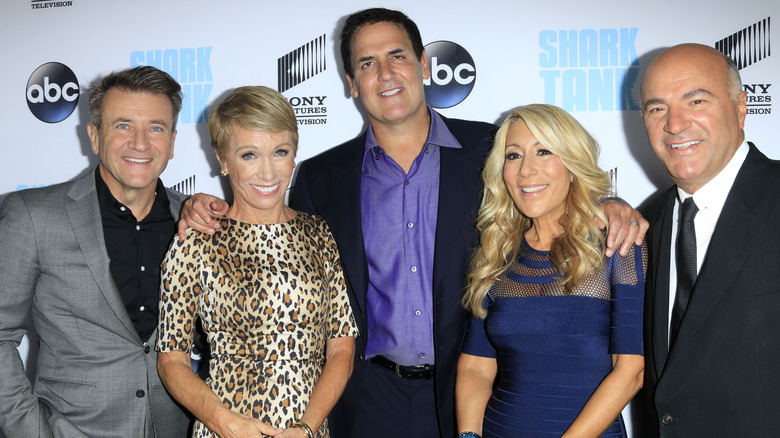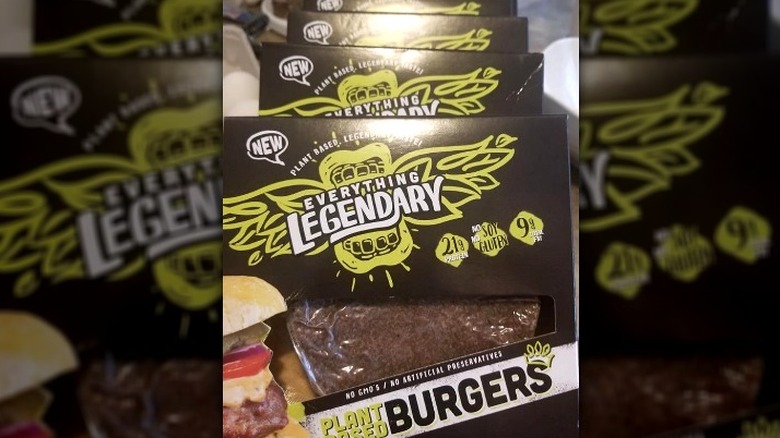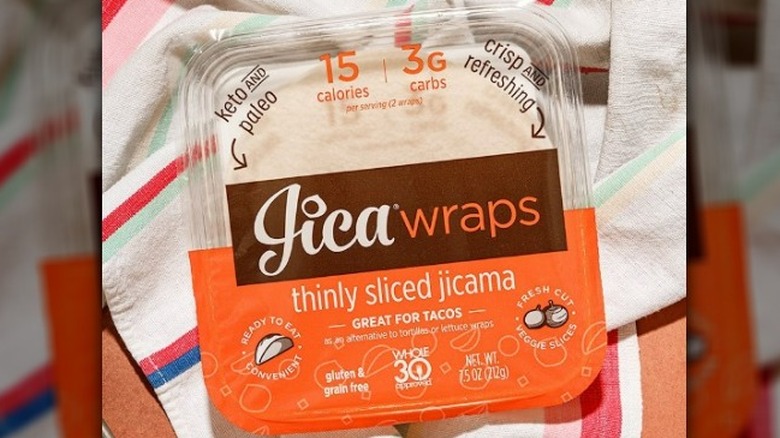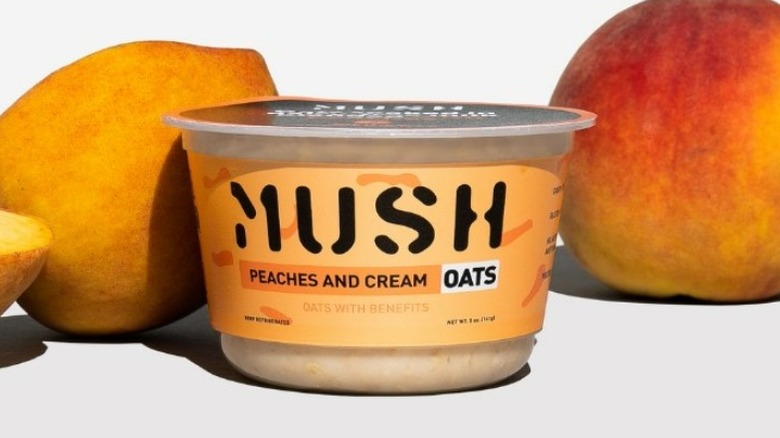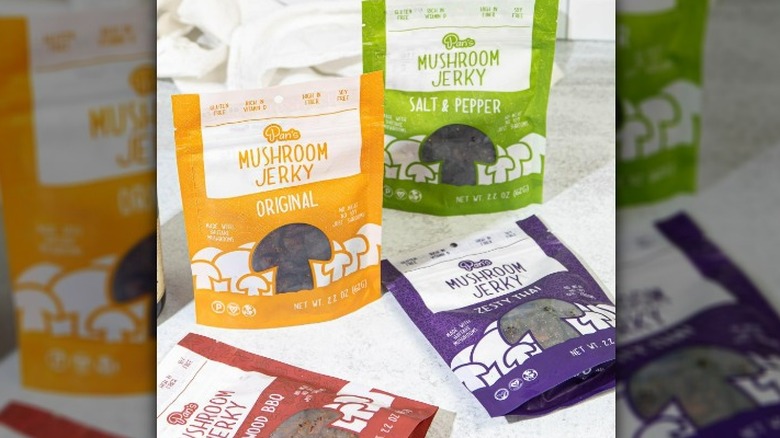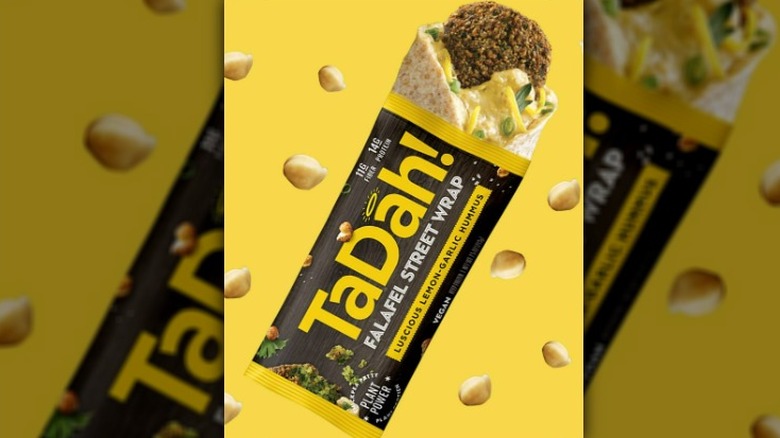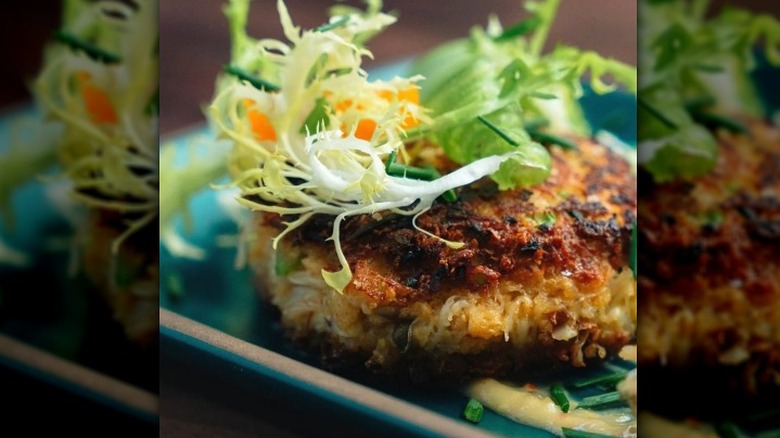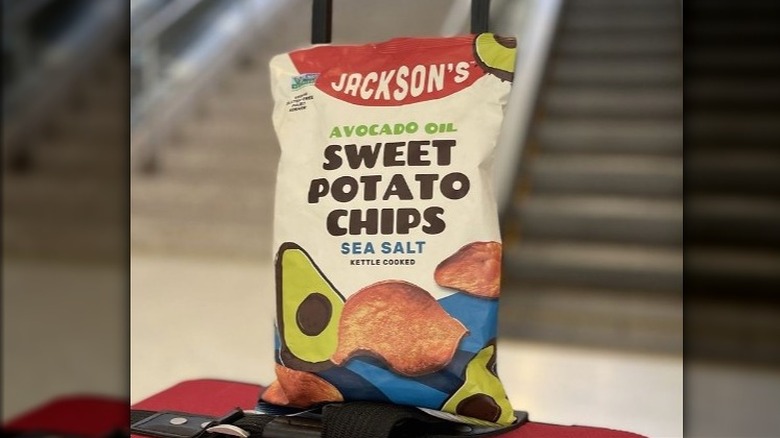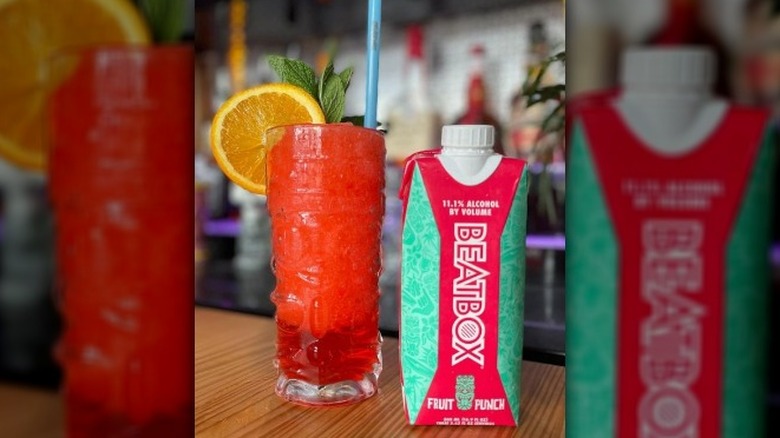The Biggest Food Deals In Shark Tank's History
What do ready-to-drink alcoholic bevvies, vegan munchie foods, guilt-free potato chips, and overnight oats all have in common? While they all sound like things you might nosh down on after a late night of partying, that's not the answer. If it's one thing we know about the hit show "Shark Tank," it's that investors are all about the flow. The cash flow. They know what's going on with the market, and when it comes to food, they're hungry for a good deal. But what exactly constitutes a good deal? While offering up $100,000 seems like a pretty substantial chunk of change, that's nothing. If you haven't picked up on the forecasted food trends of 2023, just know that it bubbles down to one word: sustainability.
In fact, in a recent survey regarding adult spending habits, at least 66% of responders stated that they would have no issue paying more for products that were more sustainable for the planet, per Sustainable Brands. For this reason alone, the Shark-vestors clearly aren't afraid to spend some serious cash on earth-friendly companies. Even with high-stakes investments, though, 43% of the deals made in the show's first seven seasons fizzled, per CNBC. But what about the other 57%? And what constitutes a huge investment? You have now entered "Shark Tank," so we hope you brought your scuba gear because these aren't just any deals. These are some of the biggest food deals in the history of "Shark Tank."
Everything Legendary Vegan Burger
According to Go Dairy Free, there are at least 25 different brands on the market that are currently hawking vegan burgers. It's a competitive business (just like the fast-casual burger business in general). Now, how many Black-owned vegan burger brands do you think are currently out there? You could probably count on one hand. That's where Everything Legendary from Maryland comes in. Another aspect that sets this business apart from the vegan burger competition is the unique ingredients that are used, per Vegconomist. Hemp protein, dried fruit (like raisins), orange peel, and mango concentrate are all part of the ingredient lineup. Everything Legendary is also a clean label company, so you're not going to get any of that nasty, unpronounceable stuff when you nosh down on one of these plant-based staples. (Yay for transparency!)
Of course, Shark Mark Cuban was all for it because it can only be assumed that anyone who has that amount of money (and is a vegetarian or vegan) always has an ear out for new and innovative plant-based nomnoms. The result from the February 2021 episode was $300,000 from Cuban in exchange for 22% ownership of the brand, per Shark Tank Recap.
Everything Legendary has rapidly expanded since then, and its burgers are now available online and at multiple retailers, including Sprouts Farmers Market, Target, and Safeway, per the company.
JicaWraps
Jicama is a root vegetable indigenous to Mexico. Its skin is like a rutabaga or a turnip, and the flesh is mildly sweet and nutty, but super crispy and juicy. If a raw potato, water chestnut, crunchy pear, and an apple had a baby, the jicama would likely be the offspring. While a flash sauté can be a suitable method of preparation, eating it raw is ideal. Jicama is high in nutrients and antioxidants and gives a nice boost to your digestion, via Healthline.
Because this globular food has a mild flavor and a high water content, it lends itself well as a vessel for other foods and works well for individuals with dietary restrictions. While it's not a "super food" by any means, it is super versatile. Vegan Foundry says that it's relatively easy to locate in your supermarket's produce aisle.
When JicaFoods made its appearance on season 14 of "Shark Tank" in January 2023, the Sharks were split. JicaFoods produces thinly sliced jicama rounds that can be used for tacos and lettuce wraps. It also offers jicama sticks and cubes as well as jicama-flavored pica de gallo at various retail stores. Interestingly enough, vegetarian Mark Cuban thought it was a great idea, but had no interest in investing, as noted by Shark Tank Recap. (Maybe he was just hungry and needed a quick snack.) Instead, Barbara Corcoran dove right in and offered the vegetal-based business $300,000 for 6% equity plus 3% advisory shares, via the recap.
Mush oatmeal
The overnight oats industry is big money. Per The Business Research Company, the market for this niche breakfast food item was worth over $6 billion in 2022 and is estimated to grow to over $9 billion by 2027. If you're wondering what the process is for making the perfect fiber-rich food, you just need steel cut oats, water, salt, and an airtight container (extra flavorings are optional). There is no heat involved, but your oats need to sit for at least 12 hours in order to fully break down (hence the" overnight" part).
Premade overnight oats are for those of us who basically want a ready-to-eat healthy breakfast ... without the waiting part. Enter Mush oatmeal. With a retail price of $3.99 (it costs a mere $0.75 to manufacture one container), a few Sharks got pretty hungry, per a Shark Tank Recap of the episode that aired in November 2017. Lori Greiner tapped out because she felt that she couldn't compete with big boss Rohan Oza, who offered Mush $400,000 but wanted 20% ownership in the company. Not to be outdoor, Mark Cuban moved in for the kill, offering less than Oza in financing and equity. In the end, Cuban secured 10% of the company, and Mush oatmeal became $300,000 richer. Who knew oatmeal could be so profitable? These days, Mush can be found on shelves at several big-name grocery chains across the country and is also available online, per the company.
Pan's Mushroom Jerky
Mushroom jerky might seem like an awful idea if you're imagining biting down on something like those dried shiitake caps you can find in the ethnic food aisle at your local grocery store. But that's not what Pan's Mushroom Jerky is all about. Sort of. While the jerky brand does utilize shiitake mushrooms, the actual product is not devoid of flavor or succulence. Shiitake mushrooms are known for their meaty texture and umami profile and are chock-full of fiber, vitamins, and minerals, per Healthline. They're a good source of vitamin B6, potassium, magnesium, and selenium, and have been linked with upping your immune system. Shiitake mushrooms are also low calorie and have a trivial amount of healthy fat, so they're a pretty universal food that can be eaten on almost any diet.
After samples were distributed among the Sharks in the November 2020 episode, a serious feeding frenzy ensued. This culminated in Blake Mycoskie and Lori Greiner teaming up and offering $300,000 with 30% ownership, via Shark Tank Recap. Plant-eater Mark Cuban countered with $300,000 for 20% equity. Eventually, Pan's Mushroom Jerky decided to go with Cuban, who accepted a counter offer of $300,000 with an 18% equity.
Oregon-based Pan's Mushroom Jerky now comes in six flavors: Original, Zesty Thai, Applewood BBQ, Salt & Pepper, Teriyaki, and Curry. Its products are available at various retailers nationwide, per the company.
TaDah Foods
Falafel is a staple in Middle Eastern cuisine. It's typically made with chickpeas, herbs, and spices (like parsley, cumin, coriander, or za'atar), mushed and formed into patties, and then deep-fried. In Egypt, it's customary to use fava beans. Falafel can be served up in pita bread with fresh tomatoes, crispy lettuce, and hummus or tahini. If a grab n' go type of meal isn't your forte, this protein-infused crunchy delight can also be served alongside hummus as an appetizer.
The main foodie goal of TaDah Foods is to bring international flavors in an easy-to-prepare way, and for customers to feel good inside and out after noshing down on its products. The company stands behind its mission: "eat good, do good," by donating 25% of profits to organizations that work to bring about social change. TaDah Foods offers four vegan or vegetarian wraps (garden veggie feta, luscious lemon-garlic hummus, spicy sweet harissa hummus, and creamy caramelized harissa) as well as three types of falafel poppers that are filled with different flavored dips. They are available online and in grocery stores, per the company.
While three Sharks immediately dropped out, Daniel Lubetzky and Mark Cuban showed interest, per the September 2019 episode. TaDah owner John Sorial suggested that the two work together, an idea that was shot down. In the end, Lubetzky won over the falafel foodie by offering $500,000 ($200,000 above asking) and garnered 25% ownership, per Shark Tank Tales.
Truffle Shuffle
Truffle Shuffle isn't just a dance move from The Goonies. This brand originally started off as a one-stop truffle shop aimed at restaurants. Then the COVID-19 pandemic reared its ugly head, which forced the owners to reimagine their business model and do a complete overhaul. After the revision, Truffle Shuffle 2.0 was born, with a new aim to offer live virtual classes for the foodie masses. Truffles are frequently featured as a major player in the company's recipes and can usually be purchased on the Truffle Shuffle website (though it's frequently sold out). Along with the actual cooking events, which range from $50 to $250, customers can also purchase ingredient kits, which are in limited supply. Truffle Shuffle also has a meal subscription service that offers VIP access to live and on-demand cooking classes, 10% off of all products (including the classes), and a box of specialty foods that you choose each month.
Truffle Shuffle's chef owners had originally waltzed into "Shark Tank" with the hopes of securing $500,000 and 5% equity, per a Shark Tank Recap of the episode that aired in April 2021. While Sharks Kevin O'Leary, Robert Herjavec, and Mark Cuban all wanted to shave off a piece of the Truffle Shuffle kingdom, it was Cuban who ultimately won the fungi jackpot. In the end, Truffle Shuffle walked away with a $501,000 investment in return for 18% of the ownership, as noted by Shark Tank Talks, which estimated the company's net worth at $6 million.
Jackson's Honest Potato Chips
You'd be hard-pressed to find a person on the planet who does not like a perfect potato chip. That means consistency, amazing flavor, quality product, and also healthy. Does that even exist? Yes, yes it does. Enter Jackson's Honest potato chips, which rebranded in 2018 to Jackson's Chips. What differentiates these crisps from their competition is that they're all-natural and clean label and contain no preservatives or artificial ingredients. Jackson's Chips also uses non-GMO heirloom potatoes, which Gardening Channel explains are tubers that have never been genetically modified and/or haven't been altered for at least 50 to 100 years. Jackson's Chips also coats its perfectly crispified taters with coconut oil and sea salt and uses a special frying process, per Shark Tank Blog.
The global potato chip market is estimated to reach over $31.1 billion by 2028, according to Data Bridge Market Research. But oddly enough, four out of the five Sharks did not take the potato chip bait, basically passing on Jackson's without much hesitation in the episode that aired in October 2017. According to Shark Tank Tales, only guest shark Rohan Oza was willing to sample and ultimately ended up offering 15% equity in Jackson's Honest potato chips while investing a sizzling $1.25 million.
BeatBox Beverages
Booze is the one of the most lucrative markets to get involved in. Statista reports that 2022 saw over $297 billion in revenue in the U.S. alcohol market. Not to be outdone, China poured in at over $341 billion. While beer and seltzers are big money-makers, premixed cocktails have really started to make a name for themselves, per CNBC. This particular alcohol niche was one of the fastest growing categories in 2021. Booze equals big bucks. And you can probably imagine that the Sharks already know this.
Enter BeatBox Beverages, a company that touts having the "world's tastiest party punch." This isn't your typical boozy boxed bevvie. The juice itself isn't carbonated (remember, it's punch), is low in both sugar and calories, and has an alcohol by volume hovering at 11.1%. Its containers are fully recyclable, and what really wins over a good investor is that these are resealable. That means you're not forced to finish or toss the remainder of your drink. BeatBox Beverages is also a carbon efficient and plastic neutral business.
None of this was lost on Mark Cuban, who gained 33% ownership of the company after an investment of a nice $1 million when the Texas-based company first appeared on the show in October 2014, via PR Newswire. We're only assuming that once the deal was made, everyone celebrated with a refreshing adult fruit punch.
